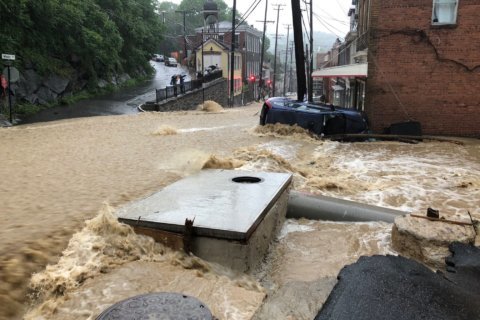WASHINGTON — Recent disasters in Hawaii and Ellicott City, Maryland, raise an uncomfortable issue among pet owners: “How do I prepare my pet(s) when disaster hits close to home?”
It’s not the most pleasant of questions, but it’s an important one, Dr. Katy Nelson said.
“By doing a little work now, you’re able to — with a lot more efficiency — be able to get your family out the door if you need to,” the veterinarian said Thursday.
Nelson told WTOP’s Debra Feinstein and Mark Lewis about six things you can do to prepare.
Think about what type of disasters come to where you are. (D.C., for example isn’t as susceptible to lava flows as it is severe weather, flooding and the like.) “Remember that most of the time you don’t get a three-day heads-up,” Nelson said.
Include pet essentials in your own emergency-preparation kit.
- Enough water for a week or two. Per Ready.gov, a person typically needs about three-quarters of a gallon daily. Adjust the estimated amount for your pet accordingly.
- A couple of weeks’ worth of food and (if applicable) medication. “Even if that medication is expired, it’s still going to be better than not having at all,” said Nelson.
- Emergency items for people — like bandages and activated charcoal — can be used on pets as well.
- Extra towels and blankets
- Store those items, a photo of you with your pets, and veterinary/vaccination records in a sturdy, waterproof storage container that you can carry easily.
Keep their identification updated. If it means extra collars or harnesses, so be it. Nelson highly recommends getting them a microchipped, and keeping current all their/your contact information — including that cellphone number.
Know where the safe places are. Not all evacuation shelters or hotels are pet-friendly. Consult with a veterinarian, professional pet-sitter or out-of-town family/friends to find a safe place.
Have a carrier ready for each pet. They should be large enough for them to stand up, turn around and lie down comfortably. Make sure each has up-to-date information about your pet and yourself.
Have a backup caretaker ready. They will be the ones who step in to help if disaster strikes while you’re away from home — or if unexpected circumstances prevent you from returning home. Make that person aware of your disaster plan. Also: Nelson recommends putting this plan in writing, in case the designated caretaker needs to show permission to access your home. Include written permission for any emergency vet treatment as well.
Learn about other things you can do to prepare your pet for disaster at Ready.gov and RedCross.org.







